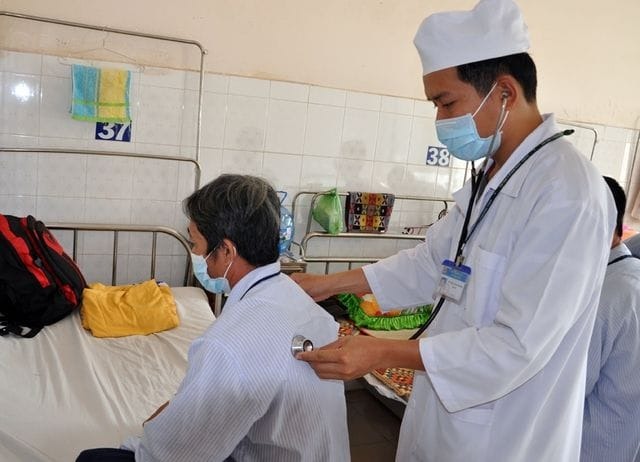The World Health Organization (WHO) has just announced that tuberculosis has replaced Covid-19 as the leading infectious disease causing death in 2023.
The World Health Organization (WHO) has just announced that tuberculosis has replaced Covid-19 as the leading infectious disease causing death in 2023.
According to the WHO, approximately 8.2 million new cases of tuberculosis were diagnosed last year, the highest number recorded since the WHO began tracking tuberculosis globally in 1995, up from the 7.5 million reported in 2022.
 |
| The World Health Organization (WHO) has just announced that tuberculosis has replaced Covid-19 as the leading infectious disease causing death in 2023. |
The report states that eradicating tuberculosis remains a distant goal as the fight against the disease faces persistent challenges such as a significant lack of funding.
According to the WHO, key milestones and global targets for reducing the burden of disease are off track, and significant progress is needed to achieve other goals set for 2027.
Low- and middle-income countries, which bear 98% of the burden of this disease, are facing significant funding shortfalls.
In 2023, the gap between the estimated number of new tuberculosis cases and the number of reported cases narrowed to approximately 2.7 million, down from around 4 million cases during the Covid-19 pandemic in 2020 and 2021.
Currently, Vietnam has a high burden of tuberculosis. In 2018, from ranking 16th out of 30 countries with the highest burden of tuberculosis and 15th out of 30 countries with the highest burden of multidrug-resistant tuberculosis in the world, Vietnam moved up to 11th among the 30 countries with the highest number of tuberculosis patients globally, and also ranked 11th among the 30 countries with the highest burden of multidrug-resistant tuberculosis in the world.
Vietnam has the highest tuberculosis prevalence rate globally and ranks 11th among the 30 countries with the highest burden of multidrug-resistant tuberculosis worldwide.
In 2023, it was estimated that Vietnam had an additional 172,000 people infected with tuberculosis and approximately 13,000 deaths due to tuberculosis in 2022, a number higher than the number of deaths from traffic accidents.
Multidrug-resistant tuberculosis (MDR-TB) is estimated to account for approximately 9,200 cases, representing 4.5% of new tuberculosis patients and 15% of those who have previously received treatment. Tuberculosis co-infected with HIV is estimated to account for approximately 4,300 cases, representing 2.5% of newly diagnosed tuberculosis patients.
Compared to the North and Central regions, the tuberculosis epidemic in the South is much more severe. In some provinces in the Southwest region such as An Giang and Can Tho, the number of detected tuberculosis cases and the tuberculosis prevalence rate per population in 2023 were 5,467 (270/100,000 people) and 2,713 (218/100,000 people) respectively, and in some areas, high-risk groups have very high tuberculosis prevalence rates, around 400-500/100,000 people.
The number of tuberculosis patients detected annually in Vietnam accounts for only about 60% of the estimated number of tuberculosis patients (in 2023, 106,086 tuberculosis patients of all strains were detected).
Therefore, more than 40% of tuberculosis patients in the community remain undiagnosed and untreated. During the two years of the Covid-19 pandemic, tuberculosis prevention and control efforts in Vietnam were severely impacted.
The number of tuberculosis patients detected in 2021 decreased by 22% compared to 2020 and by 24.5% compared to 2019, making Vietnam one of the countries with the highest rate of decrease in tuberculosis detection globally due to the impact of the pandemic.
To detect tuberculosis, the Xpert MTB/RIF test is a molecular biological diagnostic test for tuberculosis and multidrug-resistant tuberculosis recommended by the World Health Organization since December 2010. To date, approximately 140 countries and territories worldwide have implemented this test.
In Vietnam, the Xpert MTB/RIF test has been implemented by the National Tuberculosis Control Program (NTCP) since 2011 at the National Tuberculosis Standard Laboratory. To date, Vietnam has installed, put into use, and managed 332 GeneXpert machines at 182 deployment sites nationwide.
The number of tests conducted nationwide has been increasing year by year; in 2023, 452,279 tests were performed across the country, an increase of over 113% compared to 2022.
Dr. Dinh Van Luong, Director of the National Lung Hospital, Head of the National Tuberculosis Control Program Steering Committee, and the National Tuberculosis Control Program (MTB/RIF) of the National Lung Hospital, has provided external quality control samples from countries such as Laos, Myanmar, the Philippines, Bangladesh, and Papua New Guinea in recent years.
In 2024, the National Lung Hospital continued to maintain two activities: providing external quality control sample kits to Bangladesh and Papua New Guinea with over 200 kits, and providing technological consulting support for sample kit production to the Philippines.
Furthermore, with the support of CDC-US Vietnam, the program is on track to expand and develop into a regional external quality control center with new molecular tests such as Xpert MTB/XDR, Truenat MTB/RIF, and provide services domestically in 2024, with the expectation of being able to provide services to overseas organizations in the following years.
The Xpert MTB/RIF & Xpert MTB/RIF Ultra external quality control program for tuberculosis and molecular testing is organized for all Xpert providers nationwide, with funding support from the Global Fund for the period 2024-2026.
The Xpert MTB/RIF & MTB/RIF ULTRA external quality control program officially launched in 2017. Over the past seven years, it has successfully conducted 14 rounds of external quality control for Xpert MTB/RIF & Xpert MTB/RIF Ultra testing units nationwide. The number of participating units has steadily increased over the years, from 35 units in 2017 to nearly 180 units today.
The percentage of units with non-conforming results across rounds ranges from 1% to 10%. Through the organization of two annual external quality control rounds for Xpert testing units nationwide, the National Tuberculosis Control Program has been and continues to serve the goal of ensuring and improving the quality of Xpert testing for the diagnosis of tuberculosis and multidrug-resistant tuberculosis.
According to the Director of the National Lung Hospital, in order to improve the rate of tuberculosis detection in the coming time, the Vietnam National Tuberculosis Control Program is focusing resources on expanding access to rapid molecular tests for tuberculosis diagnosis recommended by the World Health Organization.
Along with strengthening and expanding the scope and number of tuberculosis tests, the Vietnam National Tuberculosis Control Program also focuses on ensuring the quality of testing as a key factor in the early detection of tuberculosis cases and effective treatment monitoring.
"Vietnam's model and experience in implementing external quality control programs will be shared at this workshop, with the hope of supporting the implementation and improvement of quality assurance methods for tuberculosis testing in the region," Mr. Luong said.
However, according to Dr. Dinh Van Luong, the implementation of these external quality control programs currently faces many limitations due to high costs and limited service availability.
Source: https://baodautu.vn/ap-luc-benh-lao-tren-toan-the-gioi-d229055.html















































































































Comment (0)